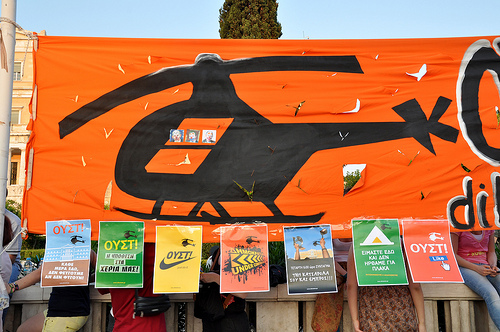-
5.4 K
Views -
3
Favorites

-
-
Teacher Dude's Grill and BBQ: Embedded with Greece's Los Indignados
-
-
-
-
-
PIGS (sometimes also PIIGS[1]) is a grouping acronym used by international bond analysts, academics, and by the international economic press that refer to the economies of Portugal, Italy, Greece, Spain and sometimes also Ireland, often in regards to matters relating to sovereign debt markets. Some news and economic organisations have limited or banned their use due to criticism regarding perceived offensive connotations.
The acronym has long been used[2] by bank analysts, bond and currency traders dating back at least to the period of the ERM and is used by some analysts,[3] academics[4] and commentators[5][6] as a concise way to refer to the Eurozone countries of southern Europe noted for similar economic environments.[7][8][9][10][11][12]
The term was denounced as a pejorative by the Portuguese Finance Minister in 2008,[13] and by some members of the Portuguese and Spanish speaking press.[14][15][13] Members of the Spanish and other international economic press continue to use the term of art in its narrow and restricted economic sense as a grouping acronym like the related BRIC.[16][17][18][19][20][21] Others however, notably the Financial Times and Barclays Capital have restricted or banned[22] the term, [23] with the FT notably reducing but not eliminating[24] its use.
-
Debtocracy (Greek: Χρεοκρατία hreokratía) is a 2011 documentary film by Katerina Kitidi and Aris Hatzistefanou. The documentary mainly focuses on two points: the causes of the Greek debt crisis in 2010 and possible future solutions that could be given to the problem that are not currently being considered by the government of the country.
The documentary has been distributed online under a Creative Commons BY-SA 3.0 license since 6 April 2011, and the production said that it has no interest in any kind of commercial exploitation of the project.[1] The documentary is available in Greek and English and will be subtitled in at least 2 other languages.[2] The production claims that half a million people saw the documentary in just the first 5 days of its release.[3]
The production team defines "debtocracy" as the condition by which Greece found itself trapped in its debt.[2] The Greek term for debtocracy, Χρεοκρατία, has the same roots ad the word for democracy. The term is coined from the Greek words "χρέος" (debt) and "κράτος" (power) in a similar manner that the word democracy is formed of the Greek words "δήμος" (people) and "κράτος" (power).
-
On May 5, 2010, a nationwide general strike and demonstrations in major cities took place across Greece. The protests were sparked by plans to cut public spending, such as wages and welfare benefits, and raise taxes as austerity measures in exchange for a €110 billion bail-out, aimed at solving the 2010-2011 Greek debt crisis. Three people were killed on the May 5 protests, which was one of the largest Greece had seen since the massive demonstrations which brought down the dictatorship in 1974.
On May 25, 2011, the Indignant Citizens Movement (Greek: Κίνημα Αγανακτισμένων Πολιτών), also called the Greek revolution,[1] started demonstrating in many cities across Greece, and the demonstrations are ongoing. This second wave of massive demonstrations is radically different from the demonstrations of May 2010 in that it is not organized by any political party, nor does it support any, and it is completely peaceful. Sparked by the 2011 Spanish Protests, these demonstrations were organized entirely using social networking sites, which earned it the nickname May of Facebook.[2]
In the early-mid 2000s, Greece's economy was strong and the government took advantage by running a large deficit. As the world economy cooled in the late 2000s, Greece was hit especially hard because its main industries—shipping and tourism—were especially sensitive to changes in the business cycle. As a result, the country's debt began to pile up rapidly. In early 2010, as concerns about Greece's national debt grew, policy makers suggested that emergency bailouts might be necessary.
-
-
The sea of people
By Pantelis Boukalas
Great finds
- Non Gamstop Casinos UK
- Casino Utan Spelpaus
- Best Non Gamstop Casinos Uk
- Siti Scommesse Non Aams
- Non Gamstop Casinos
- Casino Not On Gamstop
- Non Gamstop Casino
- UK Online Casinos Not On Gamstop
- Casino Non Aams Italia
- Nouveau Casino En Ligne France
- Online Casinos
- Non Gamstop Casino UK
- Casino Not On Gamstop
- Gambling Sites Not On Gamstop
- Gambling Sites Not On Gamstop
- Casinos Sin Verificación Casinos Sin Kyc
- I Migliori Casino Non Aams
- Casas De Apuesta
- Meilleur Casino En Ligne
- Meilleur Casino En Ligne Avis
- UK Casino Sites Not On Gamstop
- Casinos Not On Gamstop
- Sites Not On Gamstop
- Siti Di Casino Non Aams
- UK Casino Sites Not On Gamstop
- Casino Non Aams
- Meilleur Site Casino En Ligne Belgique
- Meilleur Casino Belgique En Ligne
- Meilleur Site Casino En Ligne Belgique
- Siti Scommesse Non Aams Sicuri
- Sweet Bonanza Avis
- オンライン カジノ ブック メーカー
- Live Casino France
- Cresus Casino Avis
- Casino En Ligne
- Meilleur Casino En Ligne France
- Migliori Siti Casino Online
- Casino Online Nuovi
- Casino Fiable En Ligne
- Crypto Casino Italia



